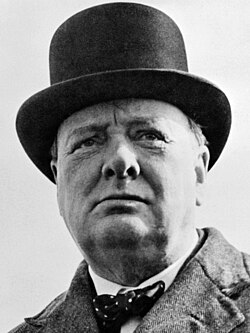Early Life and Education (1874-1895)
Birth and Family Background
Winston Leonard Spencer Churchill was born on November 30, 1874, at Blenheim Palace, Woodstock, England. He was the son of Lord Randolph Churchill, a prominent Conservative politician, and Jennie Jerome, an American socialite. [1]
Education and Early Career
Churchill was educated at Harrow School, where he excelled in history and English, and later attended the Royal Military Academy Sandhurst. He graduated in 1894 and was commissioned as a second lieutenant in the British Army in 1895. [1]
Military Service and Early Political Career (1895-1915)
Military Engagements and Journalism
Churchill saw active service in British India, Sudan, and South Africa during the Second Boer War. He also worked as a war correspondent, gaining public attention after a daring escape from captivity in 1899. [1]
Entry into Politics
Churchill was elected as a Member of Parliament (MP) for the Conservative Party in 1900 but soon switched to the Liberal Party in 1904. He held several key government posts including Under-Secretary of State for the Colonies and First Lord of the Admiralty starting in 1911, overseeing naval preparations leading into World War I. [1]
World War I and Aftermath (1914-1921)
Gallipoli Campaign
Churchill was a principal architect of the Gallipoli Campaign in 1915, an unsuccessful
attempt to open a new front against the Ottoman Empire. The campaign's failure
damaged his reputation, and he resigned from the Admiralty. [1]
Military Service and Political Roles
Churchill briefly served on the Western Front as a battalion commander before returning to politics. He held various government roles including Minister of Munitions and Secretary of State for War and Air. [1]
Interwar Years (1921-1939)
During this period, Churchill served as Chancellor of the Exchequer (1924-1929), where he controversially returned Britain to the gold standard. He was also out of government for much of the 1930s, warning against the rise of Nazi Germany and advocating for military preparedness. [1]
World War II Leadership (1939-1945)
Prime Minister
Churchill became Prime Minister in May 1940, just as Nazi Germany was conquering much of Europe. His speeches and radio broadcasts galvanized British resistance, notably during the Battle of Britain and the Blitz. [1]
Allied Strategy and Conferences
Alongside leaders Roosevelt and Stalin, Churchill shaped the Allied war strategy, participating in pivotal conferences such as Casablanca, Tehran, and Yalta to plan the defeat of Axis powers and the post-war world order. [2]
Post-War Years and Later Life (1945-1965)
Though defeated in the 1945 general election, Churchill returned as Prime Minister from 1951 to 1955. He also coined the term "Iron Curtain" in 1946 to describe Soviet influence in Eastern Europe. He was awarded the Nobel Prize in Literature in 1953 for his historical writings. Churchill retired in 1955 and passed away on January 24, 1965, at the age of 90. [1]
Legacy
Winston Churchill is remembered as one of the 20th century's most influential leaders. His steadfast leadership during Britain's darkest hours of WWII, powerful oratory, and vast contributions to British and world history secure his place as a key historical figure. [1]
